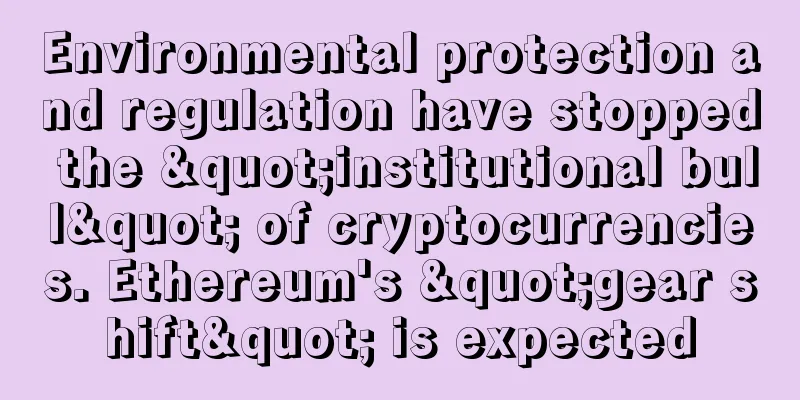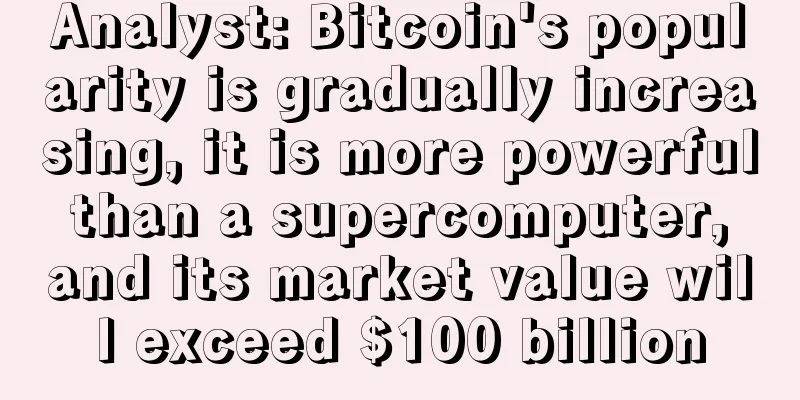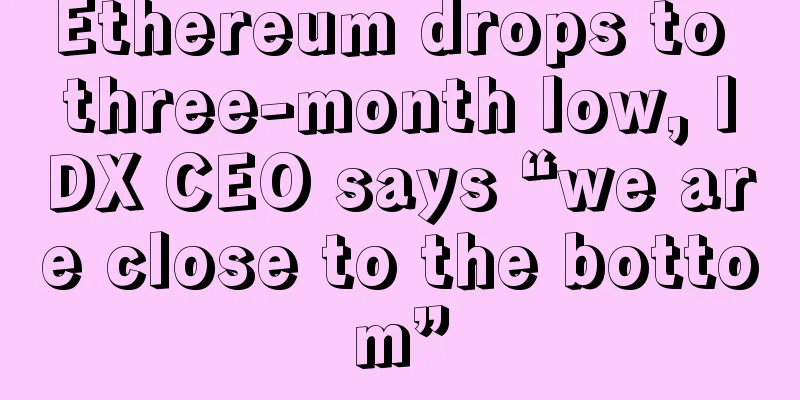Environmental protection and regulation have stopped the "institutional bull" of cryptocurrencies. Ethereum's "gear shift" is expected

|
Wu said author | Colin Wu Editor of this issue | Colin Wu Different people have different opinions on whether the bull market has reached the middle of the bull market or is transitioning from bull to bear market. In the live broadcast of Shenyu and Justin Sun on May 20, it was obvious that they were not so confident. In the live broadcast at the end of 2020, Justin Sun, Jiang Zhuoer and others confidently shouted out 100,000 US dollars. But in yesterday's live broadcast, Justin Sun adjusted it to 50,000 to 100,000 US dollars, and Shenyu was more conservative at 30,000 to 100,000 US dollars. They said that it is likely that it is still bullish now, similar to June 2017, when the price of the currency fell due to the split of the Core community and EOS's bloodsucking. They all believe that Musk is an important reason for the decline of this round of bull market. Sun Yuchen believes that Musk's back and forth has caused confusion in the community value and is the core reason for the decline; Shenyu believes that it is the fuse. In addition, Wu Jihan believes that the "violent bull market" is coming, and he and Jiang Zhuoer agree with the "bull in the middle" view. But more relatively conservative industry leaders believe that they need to wait and see. We have a different view on this. We believe that Musk's attack on Bitcoin's environmental issues has a relatively significant impact. It is undeniable that this round of bull market can be simply called "institutional bull market". Grayscale set off the first wave, Microstrategy and others took over the second wave, and Musk strongly supported Tesla to spend 1.5 billion US dollars to buy Bitcoin, which is the third wave. Chinese people may not understand the "political correctness" of environmental protection in Western society. Musk suddenly changed his mind and kept talking about this issue. Yesterday, he retweeted the FT report again: "This is a dirty currency." This article is quite clickbait, saying that the current clean energy utilization rate in the mining industry is 39%. Although this is already a high number and is still increasing, Musk is still not satisfied. Environmental protection is a political issue similar to gender and race in developed Western societies. Musk's "heavy blow" has resulted in large Internet companies (such as Apple, Microsoft, Amazon, and Netflix), mainstream celebrities (such as JK Rowling, who has expressed concern), and entertainment stars, all of whom find it difficult to publicly announce their support for or even purchase Bitcoin. It is no exaggeration to say that this has dealt a severe blow to Bitcoin's newly begun "institutional bull" and its positive impact in popular culture. In the foreseeable future, the utilization rate of Bitcoin's new energy will gradually increase, eventually reaching more than 60%. However, the total amount is still huge, and fossil energy in Central Asia and the Middle East is extremely abundant, stable and cheap, so it is difficult to convince them to give it up. Therefore, it is difficult for us to expect that Bitcoin's environmental protection issues will be solved as Musk hopes. Another driving force behind this bull market is the rise of Ethereum’s DeFi ecosystem, and the subsequent second-layer, Polkadot, Solana, BSC and other exchange public chains. This involves the second problem of this bull market: regulatory threats. In the early morning of May 21, Beijing time, a report from the U.S. Treasury Department attacked cryptocurrency tax evasion and called for stronger regulation, causing Bitcoin to suddenly fall by more than 6%. But then, as more details of the report were explained, such as the implementation of the reporting system in 2023 and the application of the current rules for U.S. dollar cash, the panic subsided and the price began to fall back. But what is certain is that the current ruling Democratic government in the United States must be relatively conservative in its attitude towards financial regulation and cryptocurrencies, and is more inclined to protect the interests of grassroots investors rather than financial innovation. Binance is already under investigation by almost all US departments involved in cryptocurrency. On the other hand, regulatory policies are still being introduced in regions where cryptocurrencies are active, such as the European Union, South Korea, Turkey, and Vietnam, and the current "Wild West" stage is unlikely to continue. DeFi is the wildest part of cryptocurrency. It is the purest state of financial freedom and is in line with the decentralization of cryptocurrency. However, a large amount of black money, hacker attacks, and underground transactions are all conducted through DeFi. As it grows, will it attract the attention of the U.S. government and other governments? This is inevitable. Another reason for this round of decline is China's regulatory policy. China's current attitude towards cryptocurrencies is very clear: first, all institutions are prohibited from participating, and ordinary people are urged not to participate, blocking payment channels; second, beware of social frenzy and mass incidents. Therefore, we can see that after the recent popularity of the zoo, the three associations under the central bank immediately issued a warning. A new phenomenon is that because China set a political goal of carbon neutrality for the world last year, the domestic mining industry may be hit hard. At present, a large number of mines have been cleared in Inner Mongolia, and other regions are still in the research stage. The relocation of mines has little impact on the price itself, but it is more of a panic in the Western society. Overall, we believe that the two core forces of this round of bull market have suffered a certain blow, so it is difficult to be optimistic about the "continuation of the bull market". The only variable is Ethereum, that is, a large number of opinions previously believed that Ethereum's market value in this round will surpass Bitcoin and become the new engine of the bull market. In July, Ethereum EIP-1559 will solve the problem that Ethereum cannot capture value from the ecosystem and increase prices. When the gas fee soars, Ethereum will be destroyed in large quantities, which will greatly increase the price. On the other hand, Ethereum developers are working hard to move from POW to POS by the end of the year. After POS is completed, 99% of the current energy will be saved, and there will be no environmental problems at all. However, this is just a beautiful expectation of industry insiders. Ethereum still has too many variables, and it is far less stable and solid than Bitcoin. By then, new problems will surely arise, such as the DeFi regulatory issues mentioned above. |
Recommend
The next mining capital of the world? 40 companies around the world have submitted mining applications to Russia
Companies from China and the European Union (EU) ...
A brief history of the Bitcoin “gold rush”
Mining or panning for gold, the search for wealth...
Is it good for a woman to have a mole on the right tip of her nose? Is it unlucky to have a mole on the nose?
The nose symbolizes a person's wealth. In phys...
Small mouth woman
A woman with a cherry mouth is lovable and makes ...
Japan's Financial Services Agency approves first compliant Bitcoin exchange
Recently, Japanese Bitcoin exchange Coincheck ann...
How is the fortune of a woman's left hand after she turns 35?
Palmistry has a comprehensive influence on us at ...
Is it bad to have thick eyebrows?
Generally speaking, people with thick eyebrows al...
How to tell a woman's bad fate from her face
In fact, many women have bad fates due to some ex...
Bitcoin miners plan to move their mines abroad to Canada, Iceland and the United States
As China’s crackdown on cryptocurrencies expands ...
Failed beauty
It is said that beautiful women are not afraid of...
What does it look like to be willing to contribute to the family? Loving the family and being responsible
A man who is willing to contribute to his family ...
The opening ceremony of the Gate.io & TokenInsight Global First Digital Asset Market Maker Competition came to a successful conclusion
On July 31, the opening ceremony of the world'...
Men's hair physiognomy diagram: hair physiognomy secrets
Men's hair physiognomy diagram: hair physiogn...
What are the facial features of a mama's boy?
When many girls are in a relationship, they will ...
Why are there so few people with the "川" palm?
There are various kinds of palm lines in palmistry...









